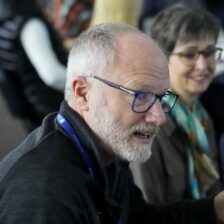 I have often wondered how a theological textbook would read if it was written by someone who is homeless, or disabled, or has been unemployed for many years, or a housewife, or ……..
I have often wondered how a theological textbook would read if it was written by someone who is homeless, or disabled, or has been unemployed for many years, or a housewife, or ……..
Most theological books I’ve come across have been written by middle class, white males. Surely they have filters that don’t allow them to see the full picture.
Growing up solidly middle-class myself, I am shocked that it took me until age 40 to grasp the “obvious” call to care for the disadvantaged in our very own communities. Now that my filter has changed, I can so clearly see the numerous passages, both OT and NT, which not only encourage us on this, but command us to do this. I wonder what other aspects I am missing that in reality should be “blatantly obvious.”
One of the amazing benefits of this journey is the recognition that moving outside of my comfort zone with people who are different from me is transformative theologically.
How much are you moving beyond your core group of relationships? Do you engage with other people? These will be people who are different from you economically (both poorer and wealthier), politically, denominationally (if we even know what that means anymore), gender, race, religion, occupation, culture, education, etc.
To disciple people who are similar to me is a fairly simple process in many respects. We already think very much alike and we will find ourselves nodding in agreement more often than not.
However, those that I am disicpling, if I am to lead them well, we need to move outside of our comfort zones. What we read together, where we serve together, are all important aspects of the journey.
I want them to feel uncomfortable at times, have them squirm. At the same time, they need to see me become uncomfortable and wrestle with my beliefs. Without this, we become stale.
Not that my beliefs are going to be swayed by every new idea that comes my way. Yet it is important to engage with different points of view that may alter my beliefs and practices, or perhaps simply further solidify the beliefs and practices I have.
We can’t hide in a protective bubble and simply engage with books and people who will “tell us what we want to hear.” We don’t have all the answers. We aren’t living the perfect life.
Let’s be sure to move beyond ourselves for our own growth, as well as those we are leading. There is nothing to be afraid of, just transformation waiting to take place.
For the Kingdom.

